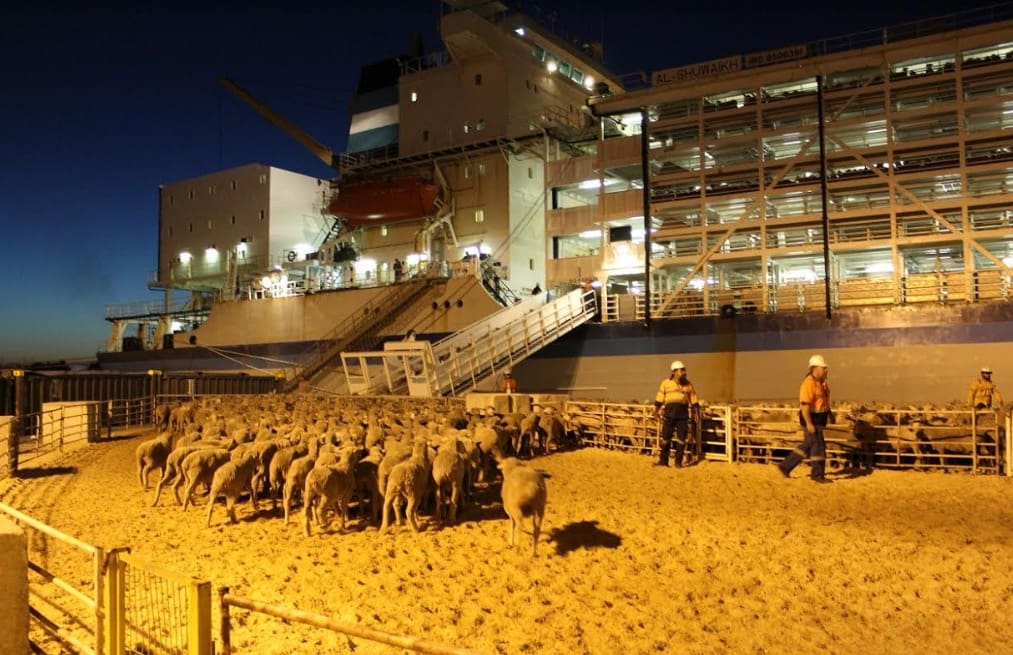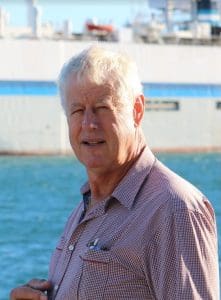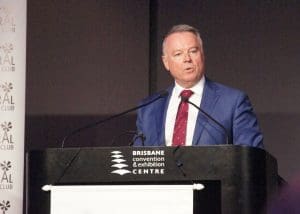
Loading sheep on the Al Shuwaikh in Fremantle, Western Australia.
WESTERN Australian farmers have again rejected the Australian Labor Party’s plan to ban the northern summer live sheep export trade if elected in the May 18 Federal Election.
The ALP this week reiterated its intention to ban northern summer sheep shipments and phase out the live trade over five years, as part of a six-point plan to re-establish national leadership on animal welfare.
The Pastoralists and Graziers Association said Labor’s plan to immediately ban live sheep exports over the northern summer would hinder investment in the WA livestock industry and increase costs throughout the supply chain, and provide little, if any improvements to animal welfare.
However, National Farmers’ Federation chief executive officer Tony Mahar said the NFF and its members stood ready to engage with Labor on the finer details of its animal welfare policy, should the party form Government.
“The NFF remains committed to a sustainable live export trade that meets the animal welfare expectations of farmers and the community,” Mr Mahar said.
Late last year, livestock exporters committed to a voluntary three month ban on Middle East live sheep shipments during the northern summer months of June, July and August, and in March this year, regulations prohibiting sheep exports during those months were implemented by the Federal Government on animal welfare grounds.

PGA president Tony Seabrook
PGA president Tony Seabrook said it is disappointing that on animal welfare, the Labor Party continued to listen to “a squeaky minority of animal activists, rather than the livestock industries that are invested in securing animal welfare outcomes in every way.”
“The Australian live export industry is leading the world in animal welfare, and by promising to immediately ban the live sheep trade over the summer months, with little information over what Labor defines as the northern summer, any improvements made so far to animal welfare will only fall by the wayside.
“Further, how can any exporter be expected to trade confidently after the 18th of May, and provide certainty to farmers when the industry’s voluntary three-month shutdown, which has now been mandated, is in jeopardy,” he said.
“The PGA calls on the Labor Party to support this vital and essential industry and to provide producers with certainty that their interests, and the interests of regional communities will not be placed second to those who are committed to seeing the end of not only live exports, but all livestock production.”
Labor’s six-point animal welfare plan
In the six-point animal welfare plan outlined by Shadow Minister for Agriculture Joel Fitzgibbon this week, a Shorten Labor government would:
- Establish an independent Inspector-General of Animal Welfare and Live Animal Exports
- Re-establish state and territory cooperation on animal welfare matters
- Renew the Australian Animal Welfare Strategy
- Review the Exporter Supply Chain Assurance System (ESCAS)
- Provide more transparency and accountability in live export trade reporting
- Immediately ban the northern summer sheep shipments and propose a plan to phase out the live sheep trade within five years.
Mr Fitzgibbon’s statement said Labor will reinstate national leadership in animal welfare matters and dedicate resources to a new national framework.
“This election is a choice between a Shorten Labor Government taking the lead on animal welfare, or more chaos and division from the Liberals and Nationals.
“Protecting animal welfare and boosting sustainable profitability in the agriculture sector aren’t competing aims – they support one another,” he said.
He said Labor would provide $1 million a year to establish the Inspector-General of Animal Welfare as an independent statutory position operating within the Department of Agriculture. The Inspector-General will be responsible for advising on the protection of animals in all Commonwealth-regulated activities and will report directly to the Minister of the day on issues concerning live export, animal welfare standards and guidelines. The Inspector-General will also work with the states and territories to establish an independent Office of Animal Welfare to oversee animal protection and welfare activities nationally.
In October last year, the incumbent Coalition Government’s Minister for Agriculture David Littleproud announced an external, independent Inspector General of Live Animal Exports would oversee the department’s regulation of live export and report to the public and the minister. He said the government would also appoint a principal regulatory officer within the department to improve regulatory practice, compliance and its culture. An animal welfare branch would also be established within the department and animal welfare indicators would be developed as part of compliance systems.
Labor promises national animal welfare approach and transparency

Labor’s Shadow Minister for Agriculture Joel Fitzgibbon
Mr Fitzgibbon said Labor will re-establish state and territory co-operation to ensure animal welfare matters receive the consistent national approach they deserve. This would include renewing the Australian Animal Welfare Strategy with governments, industry and animal welfare groups.
A Shorten Labor Government would also conduct a top-to-bottom review of the Exporter Supply Chain Assurance System to ensure it is working as effectively and efficiently as possible.
Mr Fitzgibbon said under Labor, the Minister for Agriculture would provide quarterly reports to the Parliament on new and emerging live export markets, numbers exported, allegations of breaches of animal welfare standards and investigations undertaken, and any sanctions or other action taken for breaches of Australia’s animal welfare standards.
Mr Fitzgibbon said the only way to ensure scientific animal welfare standards are met, community expectations on animal welfare are met and for certainty to be provided for our farmers is to ban the northern summer live sheep export trade and to implement an orderly phase-out over a five year period.
“Raising the bar on animal welfare will ensure our agricultural producers can continue to expand into the growing high value premium consumer markets in Asia and beyond, building on Australia’s reputation as a provider of clean, green, safe, high quality and ethically produced products.”
Mr Mahar said NFF sees an important role for the Commonwealth in coordinating national animal welfare policy and regulation, as well as research and development.
“The (Labor) policy announced today provides for such a role and we welcome that.”
Mr Mahar said the NFF also asked for recognition of the importance of industry-led quality assurance initiatives, and the significant levy-payer investment in research and development that underpins welfare improvements.
“As a sector the onus is on us to develop ways of demonstrating our integrity – but it must be industry that sets these standards, based on and informed by science.
“We look forward to working with an incoming government to deliver the continued improvement in animal welfare that Australians rightly expect.”

Exporting sheep to the Middle East in the Northern Summer needs careful management, but not banning. It can and has been done properly for centuries. Just manage it, it’s not rocket science. Why do we want to ban it? Are we admitting that we can’t manage sheep in the high humidity? Come on.